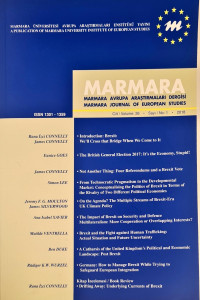Abstract
References
- Thatcher, M. (1975) The Walter Heller International Finance Lecture, speech at Roosevelt University, 22 September. <https://www.margaretthatcher.org/ document/102465>, (23May2018).
- Thatcher, M. (1977) Speech presenting The Guardian’s Young Businessman of The Year Award, The Mansion House, The City of London, 9 March. <https://www.margaretthatcher.org/document/103334>, (23 May 2018).
- Thatcher, M. (1988) Speech to The College of Europe, Bruges, 20 September. <https://www.margaretthatcher.org/document/107332>, (23 May 2018).
FROM TECHNOCRATIC PRAGMATISM TO THE DEVELOPMENTAL MARKET: CONCEPTUALISING THE POLITICS OF BREXIT IN TERMS OF THE RIVALRY OF TWO DIFFERENT POLITICAL ECONOMIES
Abstract
At the 5 June 1975 European Community referendum, England voted 68.7% in favour of the United Kingdom staying in the European Community (common market), making it the most Europhilic of the nations of the United Kingdom. On the 23 June 2016, England was the most Eurosceptic of the UnitedKingdom’s nations, voting 53.3 per cent to leave the European Union, and withevery administrative region outside of London voting to leave. To account for this great transformation in English public opinion, this article explores the politics of Brexit by focusing upon the rivalry of two contrasting domestic political economies and their different attitudes towards supranational integration. On the one hand, the political economy of ‘technocratic pragmatism’ has seen membership of and access to the Common Market as a means by which a continental European technocratic “developmental state” blueprint for British industrial modernization could be secured. On the other hand, the political economy of the ‘developmental market’ has seen the ‘continentalization’ of the European Union ‘super-state’ as a threat to the restoration of an entrepreneur-led liberal market order based upon England’sfoundational traditions of common law, individual liberty and representative democracy. The politics of Brexit, and the outcome of the 23 June 2016 referendum, can therefore be understood as a victory for the proponents of the developmental market over advocates of technocratic pragmatism, and a manifestation of how politics in England, long before Brexit, had become stranded on the common ground of the neo-liberal developmental market.
References
- Thatcher, M. (1975) The Walter Heller International Finance Lecture, speech at Roosevelt University, 22 September. <https://www.margaretthatcher.org/ document/102465>, (23May2018).
- Thatcher, M. (1977) Speech presenting The Guardian’s Young Businessman of The Year Award, The Mansion House, The City of London, 9 March. <https://www.margaretthatcher.org/document/103334>, (23 May 2018).
- Thatcher, M. (1988) Speech to The College of Europe, Bruges, 20 September. <https://www.margaretthatcher.org/document/107332>, (23 May 2018).
Details
| Primary Language | Turkish |
|---|---|
| Journal Section | Makaleler |
| Authors | |
| Publication Date | August 1, 2018 |
| Published in Issue | Year 2018 Volume: 26 Issue: 1 |


